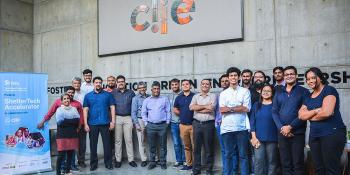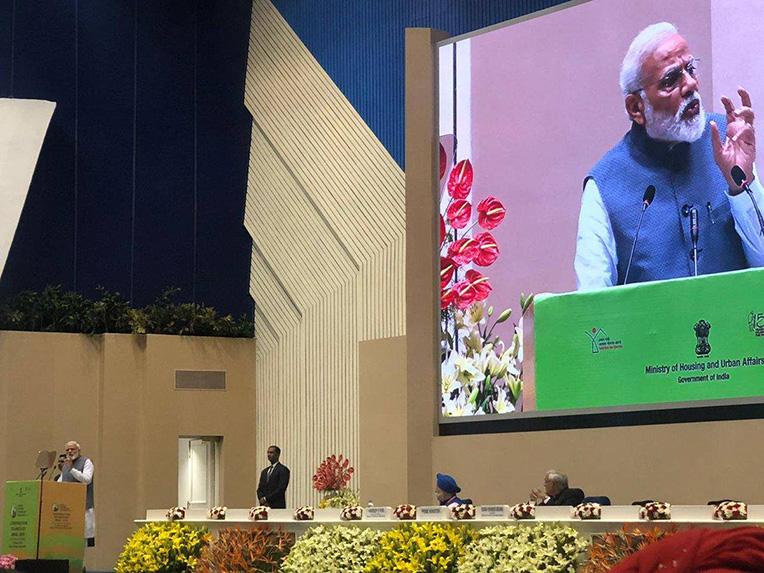
Foot on the Accelerator
MANILA (March 7, 2019) — What do a recycler, a water supplier, a construction 3D printing firm and a construction management software company have in common? Among the first cohort of Indian startups under the ShelterTech Accelerator program, they are set to create a ripple effect across the housing sector in India with innovative solutions that effectively meet the housing needs of low-income families.
The ShelterTech Accelerator was launched in India in September 2018 by Habitat for Humanity’s Terwilliger Center for Innovation in Shelter in collaboration with the Centre for Innovation Incubation and Entrepreneurship. The Terwilliger Center has run a similar ShelterTech Accelerator in Mexico with another that is underway in Kenya.
Under the Accelerator program, select Indian start-up companies will benefit from close business mentoring and training in customer segmentation, pricing, value proposition, user experience, among others, through CIIE’s extensive network of entrepreneurship and industry experts. These companies will also be able to approach the founders of myriad business ventures, tap into Habitat’s global networks, and have the opportunity to access seed funds and investments at the end of the program.
The accelerator program is a bid to address India’s massive housing needs by leveraging on the country’s booming entrepreneurial ecosystem. Based on government estimates, 18.78 million urban housing units were needed between 2012 and 2017 with most of the demand coming from the low-income groups. If the backlog worsens, nearly 110 million units will have to be constructed by 2022, the year that the Government of India envisions housing for all.
Following the program’s launch, more than 70 startups had answered the call for applications in October 2018. Among them, 14 new business ventures were shortlisted to present their pitches in-person to an expert panel. At the end of the selection, the following startups were chosen as the first cohort of the accelerator program. The second cohort of startups are currently being selected.
- OCEO Water: markets smart water purifiers with a unique pay per liter model, where recharge and credits can easily be purchased online or through the company’s web application.
- QwikSpec: offers a management software that uses real-time data analytics to lower costs, save time, and exponentially improve quality at the construction site.
- Saltech Design Labs: manufactures high-strength, low-cost paved blocks made out of plastic waste.
- Tvasta: harnesses 3D printing technology for construction, with a concrete printer capable of rapidly creating building blocks for construction.
“Our team had a tough time selecting the startups to be part of the program’s first cohort, as we had many qualified candidates with diverse and creative solutions. This only shows the sheer potential that housing has as a source of innovation that reaches across different income segments,” says Naeem Razwani, director for Asia-Pacific, Habitat’s Terwilliger Center for Innovation in Shelter. “We aim at disrupting the sector and demonstrating that products developed in the market can bring impact and be sustainable when catering to low-income segments,” he adds.
The four startups had a taste of fast-tracking at a boot camp facilitated by CIIE in Ahmedabad city, western India, from December 13–15. For the first two days, the startups attended a workshop on creating a sustainable business model and value proposition so they could better understand how to market their products. On the final day of the boot camp, industry experts helped the startups to recognize issues and find solutions that would result in progress and effective growth.
“The ShelterTech accelerator was a very focused and intense experience. We had an opportunity to relook our business model, get new ideas on our product variants, increasing the stickiness with customers and getting access to customer pilots and great mentors. The mentors assembled during the session at IIM-A (Indian Institute of Management – Ahmedabad) and the follow-up clinic in Bangalore gave us invaluable inputs and still continue to do so,” says Ajith Alexandar, co-founder of Qwikspec.
Come July 2019, at the culmination of the accelerator program, the startups from both the first and second cohorts will pitch their innovations to investors and sector experts. The winning innovators will receive seed funding to develop and expand their businesses.

Twelve startups including Tvasta and Qwikspec from the accelerator’s first cohort made closed door pitches to Indian Prime Minister Narendra Modi (pictured) at a Delhi conference recently. Photo: Global Housing Technology Challenge – India’s Facebook page.
Tvasta and Qwikspec from the first cohort had their trial run when they were among 12 startups chosen to make closed-door pitches to India’s Prime Minister Narendra Modi at the Construction Technology Expo and Conference in Delhi on March 2 and 3. The conference was part of the government’s newly launched Global Housing Technology Challenge, an initiative that aims to transform the Indian housing construction sector’s ecosystem through lighthouse or model projects using advanced proven technologies.
Ajith Alexandar, co-founder of Qwikspec, shares some highlights of his meeting with Prime Minister Modi. “I mentioned that we are an ideal platform partner for Government of India’s visionary initiatives like PMAY and monitor its aggressive roll-out milestones. The PM’s interest to know about new technologies, and the encouragement he has given to startups to help solve the country’s challenges, is a great motivator for companies like us.” Pradhan Mantri Awas Yojana or PMAY refers to the Government of India’s initiative to provide housing for all in urban areas by 2022.
Applications for joining the second cohort of startups under the ShelterTech Accelerator program have been extended until March 14. To apply or find out more, please visit sheltertech.in